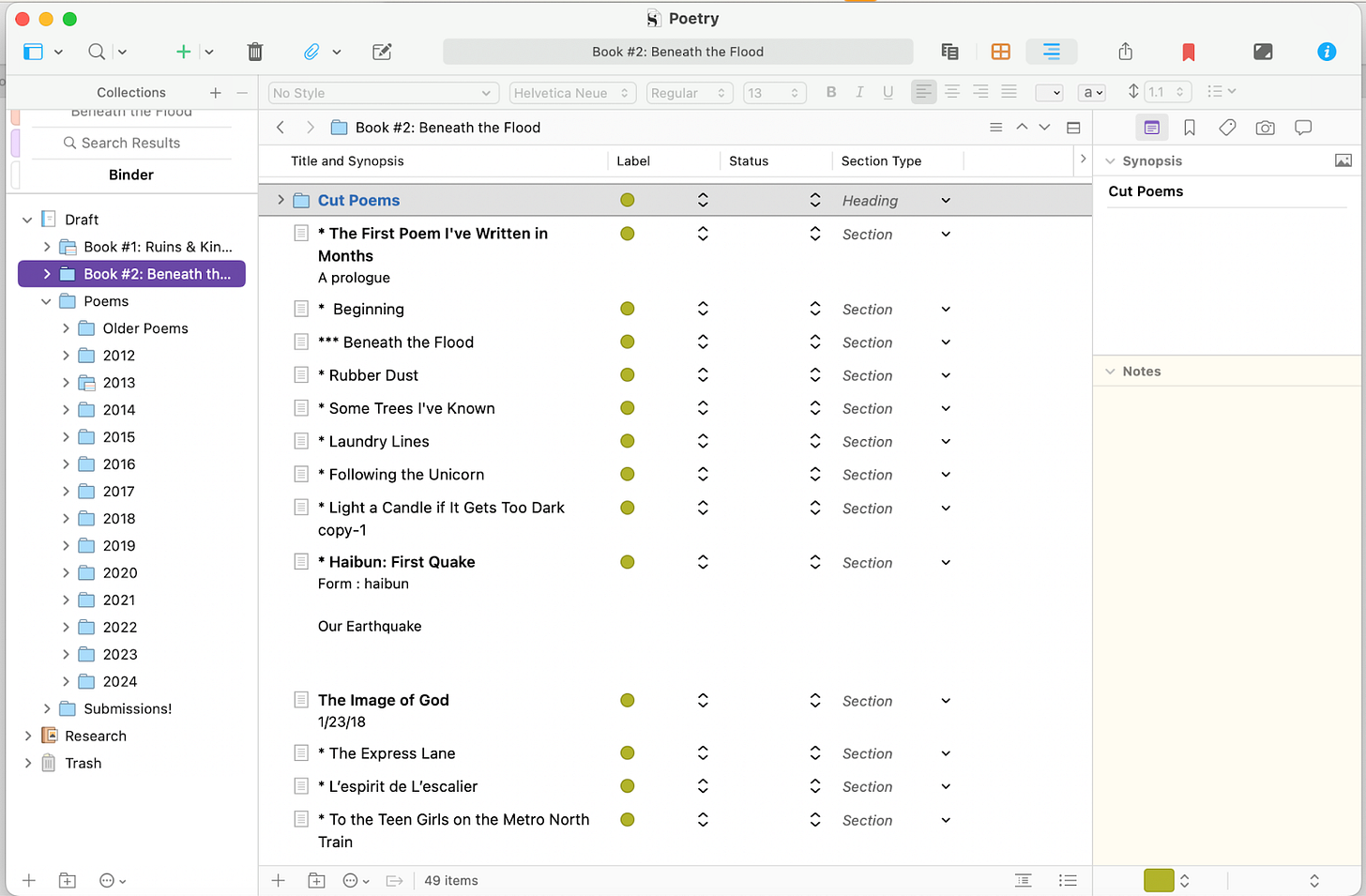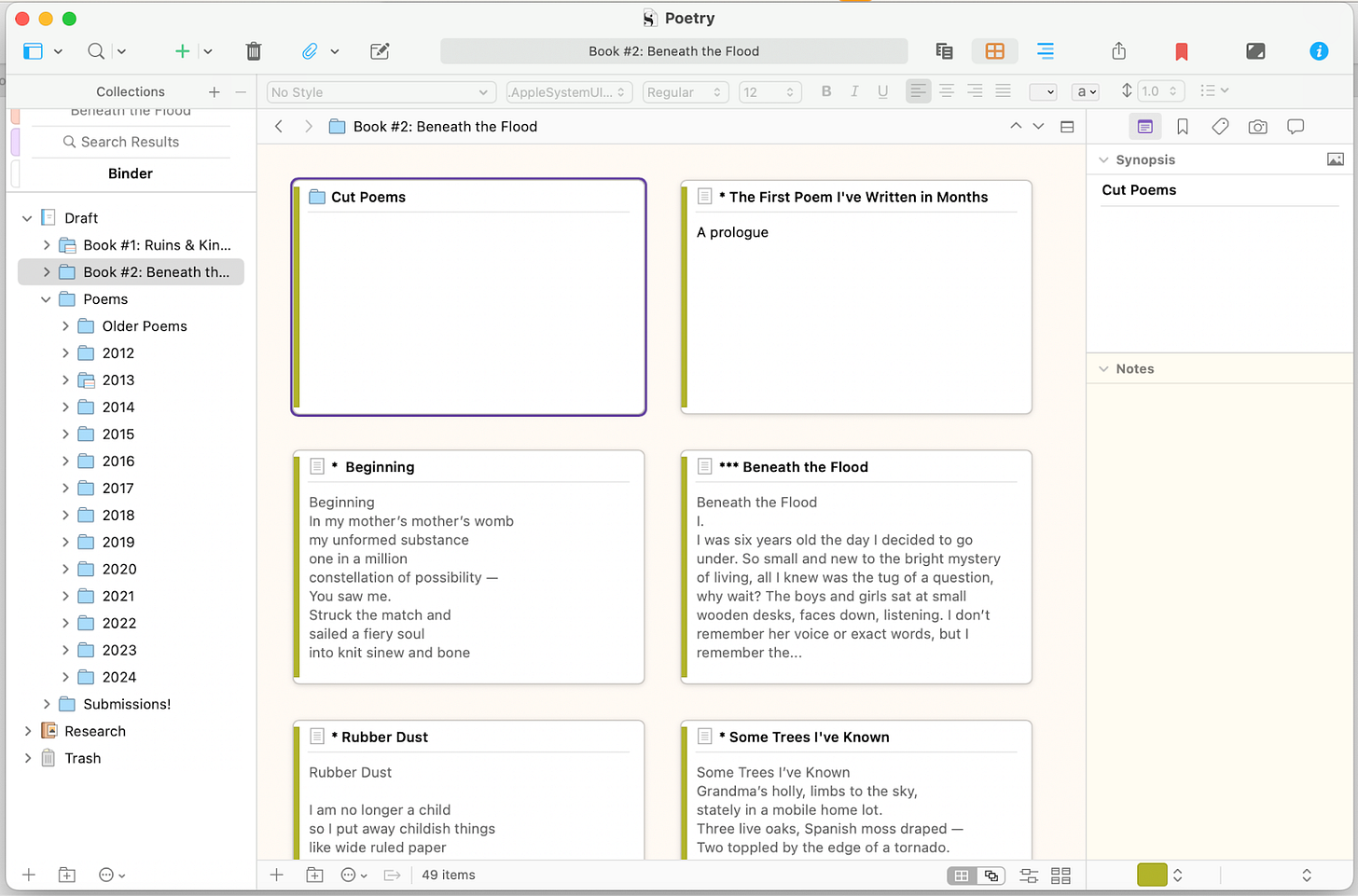How I Use Scrivener as a Poet—Jen Rose Yokel
For more articles, videos, books, and resources about faith and art, visit RabbitRoom.com
by Jen Rose Yokel
I imagine I’m not the only poet with a notebook problem. By that I mean all the spiral bound single subject books, clothbound gift journals, colorful medium-sized off-brand Moleskines collected over years, mostly filled with stream-of-consciousness journaling and half-baked poems.
Then there’s the Notes app, the ideal tool when there’s a flash of inspiration at a red light and no notebooks in sight. It’s so comforting to know as long as I have my phone I can open a blank note, type out a draft, and let it get buried in other notes until I dig it up later, like an interesting stone that needs to be polished.
These are great places to start the work of writing, but eventually those scribbles and scraps need revising, organizing, and, eventually, compiling. This is why a little app called Scrivener is the best money I’ve ever spent on my poetry.
Once upon a time, when I fancied myself a fiction writer and gave NaNoWriMo a shot, I downloaded a free 30-day trial and used it to write my draft. The resulting novel was not good at all, but at least those 50,000 words earned a hefty discount on the software. Now over a decade later, it has become an essential piece of my workflow, and probably the reason I’ve been able to put a couple books together.
I suppose this is a good place to note that I’m not being paid to say any of this and this is just 100% enthusiastic fangirling. But if you’re looking for a helpful tool, here’s how I use Scrivener to make my poetic life a lot more organized.
How it Works
For the most part, Scrivener feels designed for novelists. Think of a Scrivener file as your digital binder, holding everything you need to create a book from outline to final manuscript. So, say you create a file for your epic fantasy novel. In the left sidebar, there are multiple sections, like the “Manuscript” where you break down the story into chapters and scenes, and “Research” where you can store all the cool inspirational art you found on Pinterest, random articles about swordcraft, and a .jpg of the map you sketched on the back of a napkin.
The middle pane is where you do the actual writing, and you can open multiple split screen panes so you can set reference material side by side. Finally, on the far right sidebar, you can jot a quick synopsis or notes on the page you’re writing. Of course, all of these views can be hidden and customized, and you can switch to a distraction-free full screen writing mode if you want.
Everything is stored neatly in one place, so there’s no need to toggle between multiple documents and browser tabs. And there are many other fun little useful features, like a corkboard view that lets you see all the chapters as notecards (handy for rearranging things if you discover chapter 32 actually should’ve been the prologue), or customizable tags if you want to mark where each chapter is in the editing process.
Now here’s how I make those tools work for poetry.
A Digital Archive
Currently, I have a Scrivener file with the incredibly creative name “Poetry.scriv.” Every year, I create a new subfolder, and in that folder I create a new page for every new poem I write. (Or at least any draft that halfway resembles a poem.) I started this practice in 2012, and honestly, I’m not sure how many poems would’ve been lost to time and dust and random notebooks if I hadn’t.
This gives me a clear view of my evolving style, as well as a deep well of work to draw from and develop. I’m not the most prolific poet, but this has helped me slowly build a body of work over time. I’ve also sometimes gone back to old folders and found forgotten gems that only needed a little bit of polishing. It’s a good reminder that I am actually writing, even if there’s nothing to show for it yet. Plus, it feels good to make order from chaos, doesn’t it?
A Place to Edit
Right now, the writing method that works for me is to first draft by hand and revise on screen (with the exception of little Notes app drafts). I suppose there might be ways to scan poems and transcribe them into typed text, but even if there is, I find so much good editing happens in the process of typing a handwritten poem into Scrivener. When I’m in a dry spell, it helps sometimes to flip through my notebooks and update my poetry file with whatever forgotten scraps I have.
Once I’ve typed the draft, I can better see how the poem might look in print, and this process creates space to play with line breaks and word choice. And if I’ve over-written a poem and need to cut some lines I really like, I can easily drop them into another page and tuck it away in a Research folder just in case it sparks something new later.
A Visual Book Editor
When it’s time to turn those poems into a book, the power of Scrivener’s design really goes to work. Remember that corkboard view I mentioned? Now imagine a series of poem notecards that can be shuffled and reordered as a manuscript comes together. Half the work of building a good poetry collection is finding the right order for the right poems, And a visual approach can make the whole process so much easier.
When it’s time for me to build a collection, I’ll create a new folder for it and fill it with copies of poems that might be a good fit. Over time, I can revisit, revise, and rearrange until it makes sense, and then eventually export them to a single document. Printing poems is a great old-school option for finding the right poems and their order, but starting the process digitally makes everything so much simpler for me.
Making it Work for You
Of course, this is just my personal process. You might be a poet who submits to a lot of journals. Tags and summaries can be your friend when you want to remember where you sent a poem, when you sent it, and if it was published or rejected. Or maybe instead of organizing by year, you’d prefer to sort your poems by style or topic. If you’re a prompt collector, maybe your Research folder is a place to stow prompt lists and writing challenges until you’re ready to tackle them.
The magic of Scrivener is in its flexibility, no matter how you work. If you’ve never tried it, you can download a generous free trial at literatureandlatte.com. If you’re already using it, I’d love to hear how it works for you!
Jen Rose Yokel is a poet, writer, and spiritual director. Her words have appeared at The Rabbit Room, She Reads Truth, and other publications, and she is the author of two poetry collections. She is also the co-founder of The Poetry Pub, an online community for poets. Originally from Central Florida, she now makes her home in Fall River, Massachusetts with her poet/professor husband Chris, their rescue dog, and an assortment of books and houseplants. Her latest book, Beneath the Flood, is available now from Bandersnatch Books. You can find her on Substack at Alongside Journal or on Instagram @jroseyokel.







Jen, I laughed a bit when I saw this article in my inbox! I deeply identify. Right down to "colorful medium-sized off-brand Moleskines collected over years." I'm so glad you're telling people about Scrivener! I'll gladly fangirl with you.
I have a file named Poetry.scriv, too! But instead of organizing by date, I have it organized by what has been published where. I also have folders of "collections" as I've seen certain themes emerging in the poems I write. Maybe when one of those "collections" feels full, I'll have another book! But I really have been terrible about keeping that file updated with new bits of poetry. Maybe that's another project I should tackle this summer...
I've also created a file for the children's anthology project I'm putting together, and the ability to see things visually is SO helpful. Otherwise I'm printing everything out and covering the floor like Jo in Greta Gerwig's version of Little Women. XD
Most of my life I have allowed my ideas and characters to live in my mind. There is room for them to roam. There are piles of accumulated stuff for them to explore. There are partially completed puzzles they can work on.
I can listen in on their conversations and hear them connecting dots. They often quote something from books I have read. It is gratifying when they ask me a question I had never considered.
Lately I have been using a notebook and writing down thoughts. Words have a creative way of drawing pictures. (Even Latinized words, though their actual pictures are now fossils.) Words show me new ways to see concepts I had allowed to become static and wooden.
Actual writing is still rewriting. Preparing to write is becoming more fun.